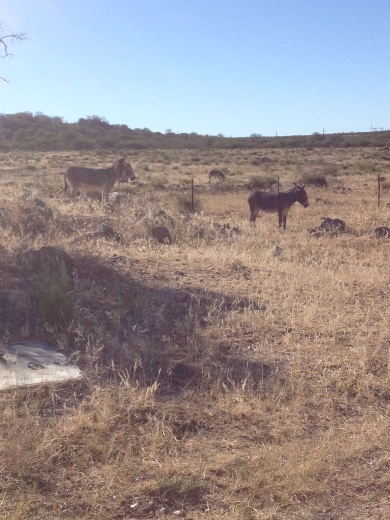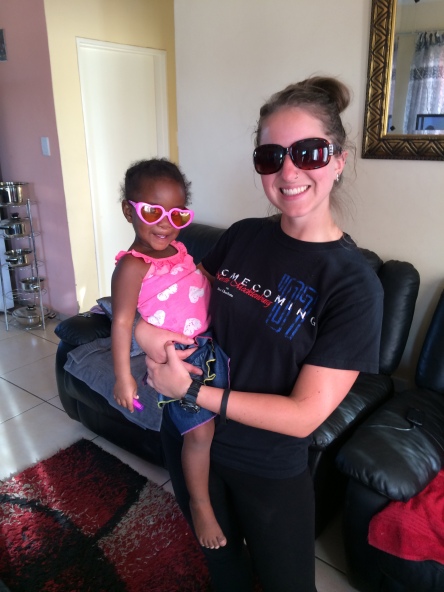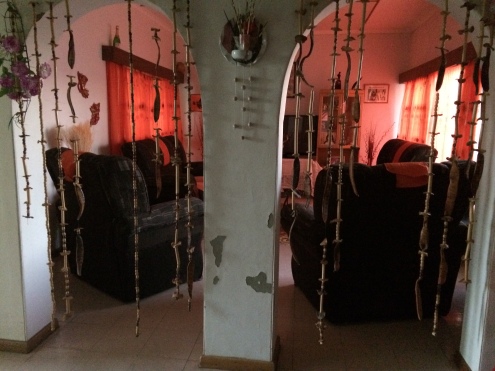I have been through many incarnations of health prophecy during my adolescent years, searching for the perfect way of eating that was going to make me feel “optimal” – having abundant energy to keep up with the active lifestyle I enjoyed, feeling confident in my body image (what every teenage girl spends far too much time preoccupied with and maintaining and building my strength to instill habits that last into my future. In the last year before my move to Africa, I subscribed to a (very) un-official Paleo diet where I attempted to stay away from simple carbohydrates as much as possible. Namely, bread was something I only had on rare occasions, mostly because, despite its deliciously tempting ways, it made me feel like garbage – tired, lethargic and constantly craving for more at the next meal. I knew that this was something that would undoubtedly change once I relocated, but I did not realize just how drastic that shift would be.
Because vegetables and fruits are considerably more expensive, especially in small towns, most Namibian families do not splurge on them very often. With both host families I have stayed with, the extent that it went with vegetables was a pepper or two, onions and carrots. Fruits were about the same diversity level, with the mainstays being apples, pears and oranges – variety is not very common in the Kunene region, and when it does come around, you pay a pretty penny for it. Bananas are N$23 for five or six, a lemon is N$10 and an avocado is N$16 (you better believe I sacrifice for those avocados, though). This has led me to get creative when it comes to making sure that I am maintaining a healthy intake of fruits and vegetables, along with supplementing a (wonderfully named) Prenatal Vitamin that Peace Corps provides for us daily. I make sure that I incorporate vegetables into as many meals as I can without getting sick of the same things over and over. I cook a stew at at least once a week with potatoes, rice, carrots, onion, bell pepper and maybe some chicken, if I am feeling fancy.. and wealthy. Another aspect of food in Namibia is that we do not make an actual salary, like the rest of my co-workers and many people in the community. We are provided with a living stipend that allows us to purchase groceries, necessary hygiene products and the occasional alcoholic beverage of choice, but budgeting and planning accordingly comes into play daily. Going into the grocery store and having to decide whether that N$20 chocolate bar is worth it (of course it is) and whether I should purchase the fresh milk that is almost double the price of the “Long Life UHT Processed” milk in a cardboard container (naturally, I should) because.. budgets. Needless to say, I spend a lot of time perusing through our one local grocery store looking for specials and figuring out what I am going to cook for the day. Most of the time, it works out pretty fantastically, and I continue feeling blessed to be sitting in my flat in Namibia eating pork belly with avocado. Here are a few photos of concoctions I’ve come up with:


Suffice all of this to say – I am loving the largely increased amount of bread and wheat in general that I am eating. I feel more energized, have less random cravings and am much more content throughout the day in regards to my hunger. I buy a loaf of whole wheat bread every 10 days or so, cook pasta a few nights a week and eat oatmeal two or three mornings out of the week. 2014 Alex would be appalled at my current choices and would be especially confused to hear that I feel great about them. I am doing two to three yoga sessions a week and running through my town the other days, which I think plays the biggest role in the difference that I feel. Accompanied with my food choices, I am able to be more active than I ever have been – although some of it is because walking is the only way to get around here with no car, most of it is because I have more time to put into my exercise routines than I did back in the States. It has been a way to relieve stress after walking through town and hearing one too many comments, a strenuous push while I am listening to the playlist another volunteer gave me, or a finalization of the day to bring my thoughts back to the importance of listening to myself and my body. As someone who knows how dramatic changes can be internally, I feel even more compelled to take care of myself because I am out of my routine: eating differently, communicating differently and even breathing differently. The ideologies and niche that I have known for the past 24 years have mostly become thoughts of the past and I am reveling in my ability to build from the pieces that I decided to keep, while incorporating the new parts of myself that I am finding along the way.
With these thoughts, I will leave you all with a few more posts from May and June.
Sunday, May 24, 2015 – The first bundle of SNAIL MAIL that almost made me cry.
Before I get into the past two week’s breakdown, I wanted to share a pretty funny quote from a few weeks ago that I completely forgot to include in one of my posts. One of the other trainees who lives in my neighborhood had her birthday pretty soon after we got to our training center and moved in with our host families. Her host mother wanted to have a braai (essentially a barbeque) to celebrate her and her host brother’s birthdays simultaneously. She was kind enough to allow her to invite a few of the other trainees who lived close-by and it was even warranted excitement for her host mother to purchase an entire goat to roast that evening. Culturally, no matter who you talk to, the head of the goat is the most coveted part of the animal and if you get a chance to taste the tongue, you really lucked out. I happened to be at the right place at the right time and was given a large piece of chicken-like meat just as the birthday girl was being given the smiley – another one of the goat’s coveted organs: the eyeball. As we toasted our goat body parts and took our first bites into a new experience, I asked if she would like a taste of the tongue as I realized that it actually WAS delicious and I wanted to make sure that she got to add this to her list of birthdays to remember. One of our fellow volunteers stood by watching us as we contemplated what we were chewing and burst out laughing at our next dialogue.
Alex: (through a mouth full of delicious, juicy goat tongue) “Oooh, this goat tongue is actually really tasty! Would you like a bite of my piece? I know there isn’t much in the head that is sitting on the table in front of us and I really think you should taste it. It is your birthday, after all.”
Christine: (making a face equivalent to what I imagine eating mud to be like) “Oh, no thank you, my mouth is quite full of goat eyeball at the moment. I’ll try it another time I think.”
This is a typical Friday night in Namibia, y’all. Shots of wine and disgusting pink tequila were added in there at some point as well, but that can wait for another story. Or maybe not.

Back to the present. So this week we found out our site placements where we will be stationed for the next two years. I will be going to a small town in the North West called Khorixas that used to be the Damara capital of Namibia until very recently. This means that it will be very important for me to continue practicing and speaking Damara once I get to my site and to probably sit in on elementary school classes in order to get a better understanding of my new language. I will be working with the Ministry of Youth as my primary assignment, most likely organizing youth groups, teaching life skills and healthy living, as well as doing work with computer classes and technology infrastructure. These, of course, are just the baseline for what the ministry is hoping for and looking for in a volunteer – we have been informed that sometimes sites are exactly like what they describe in the paperwork, but other times it is quite different. As I’ve said before, I am looking at this experience as a lesson in patience and understanding, both for myself and for the new culture that I am attempting to integrate into. I do not have expectations and will embrace whatever comes my way with as much love and humor as I can.. even if that means my toilet will become a hole in the ground and I will have no electricity. Nah, I know that I have running water and electricity at the very least. Well, that is if the paperwork is correct, of course. As far as I know, I will be working and living on the Ministry of Youth compound, probably in a room off to the side of the main building. There are only a few trainees who will be living in traditional huts and homesteads, surprisingly, and they are being total champs about their future. I’ve been very impressed with their abilities to take their assignments in stride.

Did I mention that we do not have hot water at my host family’s house? The shower comes out SO COLD that it takes your breath away most of the time. I have become very efficient at getting in and out as quickly as possible and most of the time just “bucket bathing” in the sink instead of getting under that demon shower head. I remind myself that even though this is technically winter time in our southern town now, the move up north will make me appreciate the cold water soon enough. The farther north you go, the hotter it usually gets and the more brutal the summer time is.

I hate that by now I have become quite used to this, but there are just SO many stray dogs that wander the streets and in the neighborhoods. Many of them have only ever known life without a home and do not react well to being approached by a human being. Our first week at our training site, one of the VSNs (Volunteer Support Network – we have had one or two of them with us each week in order to get an idea of what work they have done while they have been here and for them to answer questions for us differently and with a diverse population. They have been awesome to have around) told me that if you ever feel threatened by one of the dogs, because some of them can get pretty aggressive if you are too close to their side of the street, that all you have to do is pretend to pick up a rock off of the ground and they will run away. From the time they are puppies, they are used to being abused and mistreated, so they are very classically conditioned to pay attention to what a person’s hand is doing at any given time. It broke my heart but at the same time, gave me a sad sense of security. I’ve felt that phrase enter my mind a few times since moving here, in regards to many circumstances, including white privilege that I have become even more aware of. There is still such a hierarchy between the races and something that many Namibians are struggling with post-Apartheid. I have heard many people, including my host Mom (who is black), reference black people as lazy and not deserving of having nice things. She was speaking to her cousin once about why it seems like only the white people have nice homes and they were both in agreement that it is because black people cannot handle the responsibilities of keeping up with a good home. “Give a house like that to the blacks and they will have destroyed it in a month” was a direct quote given as I cringed in the back seat of the car waiting for her other friend to get beer. This is a dialogue that I am not sure how to interact with yet, so I have chosen to stay behind on these topics and observe for now. I can anticipate that later on in my service, this will be a great place to start conversations in hopes of a more positive outcome for my community and working to lessen the burden of institutionalized racism. It is hard to hear such engrained self-depreciation, but I am guessing that 25 years after the Civil Rights Movement in the United States many people felt the same kinds of oppression that the Namibians are dealing with now. Of course, this is coming from an outsider on both occasions and I could be completely wrong, which is why I have chosen to be a silent observer for now. I am here to learn and to see where I can fit in eventually regarding these conversations.

Saturday, June 20, 2015 – A host Mom that reminds me of my grandmother.
It has been almost a month since I last updated anything, but for good reason. At least, I think so. We had our swearing in ceremony on Thursday morning where I gave a small poem in Khoekhoegowab to an uproar of excitement and clapping. Anytime Namibians hear a white person attempting the language, they are astounded and shocked – mostly because they are used to hearing Afrikaans as the language of choice for anyone white. It has been something to get used to, the laughter and look of confusion on a stranger’s face when I introduce myself or shake someone’s hand, asking “Mi du re?” to inquire how they are. It can feel like I will never make it past these basic introductions, but I know that I am fully capable and have made great strides already. Now that I am settled in Khorixas, my permanent site, I will be able to find a tutor and really make the progress that I want to in my language.
We had an American Cultural day two weekends ago, where all of the trainees grouped together based on our home states got together to cook traditional food for our host families, language trainers and Peace Corps staff. Begrudgingly, of course I found my place in the South where we made baked beans, banana pudding and a delicious Louisiana gumbo. Luckily, the Southern group is full of great volunteers who are perfect examples of the greatness that comes from the lower regions. The families loved getting a taste of what our food was like and the tacos were definitely the biggest hit. From what we have heard, this is typically the case for most volunteer groups that come through – the families ask them to make tacos, despite their Mexican origin, because almost everyone loves them. As is typical for Americans, we borrow from another culture and make it our own. I’m beginning to appreciate this aspect of my heritage more and more.

During the presentation, each target language group had to give a speech in the language to showcase our progress and give our appreciation to our trainers. I was elected by my group to give the speech in Khoekhoegowab after the three of us wrote our words of thanks together, in between bursts of laughter and thoughtful reflection. It is always a nerve wracking experience to present yourself to a group of people who speak the language natively and hope that you do not disrespect them by butchering the words and accidently saying the derogatory word for female genitalia (≠nuise) instead of nose (≠guise). But hey, you live and you learn, right? (Sorry about that one day in class, JJ..) The speeches went well for all of us and I hope that someone was recording them so that I can send the video out in an email at some point. It would be great for my friends and family to see what we have all been working so hard to learn these last two months, thanks to the patience and countless hours our trainers have worked with us.

So yesterday afternoon, I made it to my final destination in Namibia to such welcoming and open arms. My counterpart came to pick me up from the training center and we drove to Windhoek to pick up the receipt for the brand new bed that the Ministry of Youth had purchased for me (did I mention that I am still in the Peace Corps? Sometimes it feels like I am being treated far too well.. I haven’t even had to use a pit latrine yet..). As I am coming to learn, processes and red tape are abundant in this country, sometimes even more so than in the U.S. What should have taken a moment to run into someone’s office and pick up a form ended up taking two hours with my counterpart and I having to continuously check on the progress of putting the receipt in the computer (why that took so long, I am still unclear) and walking around to different offices to make introductions and fill out other miscellaneous forms. The amount of paperwork that was piled high in the offices made me think of both how progressive my new country is as well as how far we have to go to make things easier for everyone involved in government organizations. I made the mistake of asking about scanning documents and uploading them onto Dropbox so that everyone would have access to them and was received with laughter and shaking of heads. I’m getting used to this reaction.

After a two hour delay to our morning, we were finally on our way to Khorixas. A few brief stops along the way to pick up snacks in a larger town (where kale salad and tomatoes were abundant) and to drop off the paperwork to deliver my bed and four hours later, we arrived in my new town. We stopped in at the Ministry of Youth to greet my coworkers, who had “cool drink” and sparkling water awaiting me to welcome me and celerate. I don’t think I’ve mentioned cool drink yet, because I don’t drink it, but this is what Namibians call soda. It is an integral part of the culture here, especially when it is ridiculously hot in the summertime, and it is often given away at the car wash or at the barber in order to entice a weary wanderer to purchase a product. In any case, we drank a cool drink together and talked a bit about what my first week at work would look like before the director took me to the host family that I will be staying with for this week before my bed arrives. The residence reminds me so much of my Grandfather’s house that it nearly took my breath away walking in. There are big bay windows in every room where the wind freely floats in, creating the most beautiful wind tunnel in the hallway outside of my room. Trinkets of all kinds line the shelves and tables throughout with an assortment of coffee mugs and pictures in the kitchen and living room. Big cozy chairs and bureaus with a Mickey Mouse poster in my bedroom are the most reminiscent pieces of this abode and I feel so fortunate to have these two wonderful people take me in.

After dinner last night, we went to a neighbor’s birthday celebration to braai and eat cake – a unique difference between Namibian and American culture is that the person who is having the birthday provides all of the food and drink and cake for their celebration, whereas in America it is mostly the other way around. Insert more introductions for the next few hours, bewildered looks as a young white lady attempts to speak Damara and another cool drink before I was in bed after an incredibly exhausting day. I woke up comfortably in an unfamiliar place, made pour over coffee for my host parents and sat with them for breakfast. This will be my first full day in Khorixas, so I plan on walking the town, as I do in any new place I am visiting, and meet up with another volunteer who is serving here.

